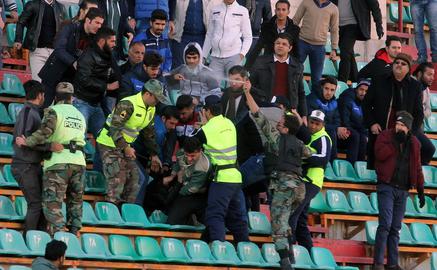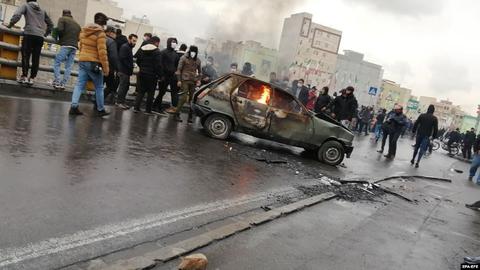In a secret order to sports federations, Iran’s ministry of sports has instructed the immediate cancellation of all national sports events in cities where protests have erupted over the last few days. The order was issued by Mohammad Reza Davarzani, the Deputy Sports Minister for Championship Sports, and the ministry’s security department is responsible for identifying cities where national sports competitions take place, and where problems might arise.
Since the protests against increased gas prices started on Friday, November 15, three sports federations have been ordered to cancel events where a “crowd” of people might be possible. The Iranian Football Federation was the first to receive orders from security agencies. On the afternoon of Saturday, November 16, the federation canceled five of seven Iran’s Futsal Pro League matches scheduled for the competition’s 17th week.
All sporting events were canceled in several cities, including Sari in northern Iran, Kermanshah in the west, Isfahan in central Iran, Varamin in Tehran province and Behbahan in the southwest. Following on from these cancellations, the Iranian football federation canceled further futsal matches.
Mehdi Taj, the head of Iran’s football federation, did not contest the sports ministry’s order. During the nationwide protests in late 2017 and early 2018, Taj was one of the few heads of sports federations that stepped forward and supported the move to cancel football and futsal matches. His military and intelligence background had prepared him to align himself with decisions taken by the Supreme National Security Council.
During the 2017 and 2018 protests, the ministry of sports ordered all Iranian sports federations to, as much as possible, reduce the number of sporting events, delay them or change the location and times of the events. This order was more strictly enforced in northern Iranian cities and in provinces next to the western borders of Iran. At the time, Mehdi Taj proposed to the ministry of sports a three-week delay in Football Pro League competitions, but the ministry did not agree, saying there was a degree of “sensitivity” in taking such an action.
At the time the Iranian Student’s News Agency (ISNA) reported that the match between two basketball teams In Gorgan, part of Basketball Pro League competitions that were in their 18th week, would take place at 1:00pm — without the presence of spectators. The match had originally been due to be held at 4:00pm but, according to ISNA, the city governor’s office and the provincial Security and Safety Council directly ordered the change of time and the ban on spectators. In general, and in ordinary times where public unrest is not a concern, provincial security and safety councils are tasked with coordinating all sports events, from setting the time and place to ensuring safety and security at the stadiums, police presence and services such as emergency medical teams and firefighters. But, in extraordinary situations, two other agencies also decide whether a sports event will take place or not. The first is the sports ministry and the second is the Supreme National Security Council. In the last few days it was the sport ministry’s Davarzani who was responsible for the order that was sent to sports federations and individual cities.
The Formula for Canceling Sports Events
To cancel important sports events in the cities where security forces might lose control during the games, there is a formula authorities follow: If the town in question has a stadium or a sports hall outside the city proper, then the event is moved to that place; otherwise the event will be canceled.
For instance, during the unrest in late 2017 and early 2018, the match between two volleyball teams, one from Qazvin and the other from Mahabad, was held at 11:00am instead of 4:00pm, without the presence of any spectators. The governor of Mahabad conveyed his decision to the referees and managers of the two teams at 8:00pm the previous night, but kept the media in the dark so that not even one spectator would try to attend the event.
On Monday, November 18, Tasnim News Agency reported that two Basketball Pro League games in the cities of Qazvin and Isfahan had been canceled. The same news agency also reported that all sixth-week Volleyball Pro League matches had been canceled but did not report who had issued the order or for what reasons. [Persian link].
It is not only sports with large numbers of spectators that have been canceled. The Iranian Taekwondo Federation has also been ordered to cancel events. As a result, all matches in the fifth and the sixth weeks of the Taekwondo Women’s Pro League season will not take place.
The sports ministry has ordered Persepolis and Esteghlal football clubs to either cancel their practice games in Tehran or practice without spectators behind closed gates. Following the sports ministry’s order, Persepolis canceled its practice but said that it had done so because of a “technical decision” taken by its manager Gabriel Calderon.
The football federation is waiting before it announces the cancelation of Pro League competitions. However, two games in the cities of Sirjan and Jam, scheduled for Thursday, November 21, will most probably be canceled if the protests continue. But the real worry for the sports ministry and the football federation is the competitions scheduled for this Friday, November 21, in the cities of Tabriz, Tehran, and Abadan — some of the epicenters of popular protests in recent days.
...the Internet has Become Indispensable
Without internet connection, holding matches in these three cities is almost meaningless. It would be almost impossible to send out news and photographs and media and TV broadcasts will not work. On the other hand, if the protests continue in Tabriz, Tehran, and Abadan during the games, the police will not find it so easy to control people in the stadiums.
The game planned for Sunday in Karaj between Saipa and Boushehr’s Shahin Bushehr football teams seems harmless enough, but the football federation must be very worried about the upcoming match between Zob Ahan and Foolad football clubs in Isfahan’s Shahin Shahr. The most important event, however, is Sunday’s match between Mazandaran’s Nassaji and Tehran’s Esteghlal football teams in Ghaem Shahr in northern Iran. The football federation has told Esteghlal FC to be prepared to delay or cancel the game. “We have no problem with rescheduling the game and we even welcome it,” Javad Zarincheh, the manager of Esteghlal FC, told Tasnim News Agency.
More cancellations of sporting events are likely on the way. The ministry of sports is trying to control the scheduling of sports events before the Supreme National Security Council decides to take over and cancels all sports competitions in Iran, regardless of where they are to take place.
Related Coverage:
Who Decided to Raise the Price of Gas in Iran and Why?, November 18, 2019
Murder and Mass Arrests to Silence Behbahan Protesters, November 18, 2019
Schools Closed and Internet Blocked Across Iran, November 18, 2019
Iran Bans Journalists From Reporting on Protests, November 17, 2019
Iran Pulls a “North Korea” by Cutting off Internet in Response to Protests, November 17, 2019
Is Gasoline Really Cheap in Iran?, November 17, 2019
Gas Price Protests Turn Ablaze Across Iran, November 17, 2019
Guards Fear Internal Turmoil as Much as US Attack, November 17, 2019
Who Benefits From the Rise in Gas Prices — The Rich, the Poor or the Regime?, November 16, 2019
Forty Protesters Arrested in Yazd, November 16, 2019
Attack on Kazerun Seminary, November 16, 2019
Iran Gas Price Protests Enter Third Day, November 16, 2019
Iranians Protest After “Sad but Necessary” Decision to Raise Gas Prices, November 15, 2019
visit the accountability section
In this section of Iran Wire, you can contact the officials and launch your campaign for various problems


























comments